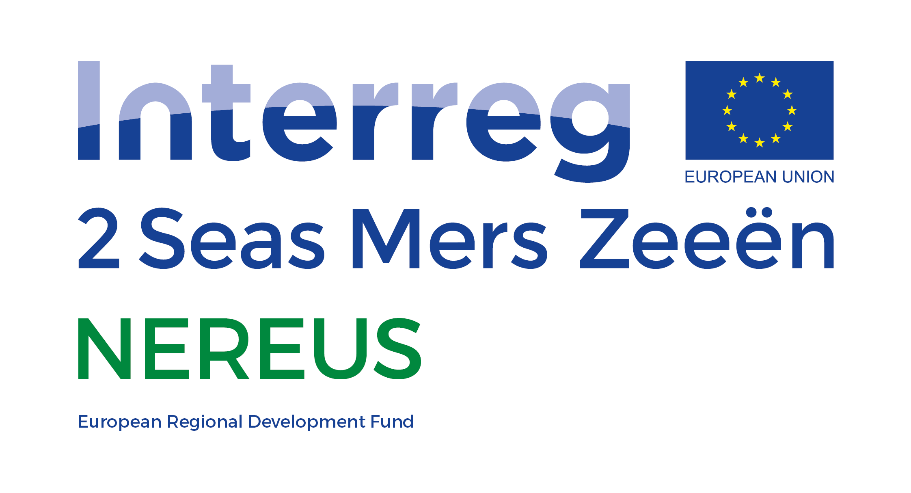PR 00308: verschil tussen versies
Geen bewerkingssamenvatting |
Geen bewerkingssamenvatting |
||
| (3 tussenliggende versies door 2 gebruikers niet weergegeven) | |||
| Regel 8: | Regel 8: | ||
''Project ‘Nereus’ is financed by the Interreg 2 Seas programme, a transborder collaborative programme which receives financial aid from the European Regional Development Fund. For more information, please visit:'' {{Cite|resource=Resource Hyperlink 00733|name=www.nereus-project.eu|dialog=process-linkwebsite-dialog}} ''or watch this'' {{Cite|resource=Resource Hyperlink 00732|name=NEREUS Video|dialog=process-linkwebsite-dialog}} ''explaining the project.'' | ''Project ‘Nereus’ is financed by the Interreg 2 Seas programme, a transborder collaborative programme which receives financial aid from the European Regional Development Fund. For more information, please visit:'' {{Cite|resource=Resource Hyperlink 00733|name=www.nereus-project.eu|dialog=process-linkwebsite-dialog}} ''or watch this'' {{Cite|resource=Resource Hyperlink 00732|name=NEREUS Video|dialog=process-linkwebsite-dialog}} ''explaining the project.'' | ||
{{Project config}} | {{Project config}} | ||
{{Project | {{Project | ||
|Name=NEREUS | |Name=NEREUS | ||
|Supercontext= | |Supercontext=PR_00421 | ||
|Start date=2017/10/01 | |Start date=2017/10/01 | ||
|End date=2021/09/30 | |End date=2021/09/30 | ||
|Summary=The NEREUS project tackles common global challenges by boosting further the development of green economy | |Summary=The NEREUS project tackles common global challenges by boosting further the development of green economy and transforming wastewater into a valuable source of water, resources (eg cellulose, nutrients), and energy that could be reused. | ||
and transforming wastewater into a valuable source of water, resources (eg cellulose, nutrients), and energy that could be | |||
reused. | |||
|Show summary=Nee | |Show summary=Nee | ||
|Contact person=Gebruiker:Emma McAteer | |Contact person=Gebruiker:Emma McAteer | ||
|Stakeholder= | |Stakeholder=STKH 00121,STKH 00127,STKH 00128,STKH 00126,STKH 00124,STKH 00095,STKH 00078 | ||
|Show extra=Ja | |Show extra=Ja | ||
|Show navigation tree=Ja | |Show navigation tree=Ja | ||
| Regel 30: | Regel 27: | ||
|Show edit button=Ja | |Show edit button=Ja | ||
|Show VE button=Ja | |Show VE button=Ja | ||
|Show sidebar= | |Show sidebar=Ja | ||
|Show category label= | |Show category label=Ja | ||
|Show title=Ja | |Show title=Ja | ||
}} | }} | ||
Huidige versie van 25 aug 2022 om 14:04
Since October 2017, the Water Technology Research Group has been working on the Interreg 2 Seas Project NEREUS; an acronym for New Energy and REsources for Urban Sanitation. The NEREUS project wants to boost the development of the green economy and the transformation of wastewater into a valuable source of water, nutrients (e.g. cellulose, nutrients), and energy that could be reused in the Interreg 2Seas area.
The importance of reusing wastewater is emphasized by global issues such as water scarcity, concerns about the availability of finite resources such as phosphorous (essential for agriculture) and the push to reduce CO2 emissions by finding more sustainable energy sources. These problems all point towards the need to make our wastewater treatment systems more circular; a goal that can be achieved by technology and decision makers. One of the objectives of the NEREUS project is to deliver enough practical evidence of resource recovery to aid both private and public decision makers with this matter of circularity. The NEREUS partner consortium consists of pilot partners in the Netherlands; Evides Industry Water, Belgium; Waterlink, DuCoop, France; CAPSO and the UK; Southern Water. HZ University of Applied Sciences is a knowledge partner within the consortium alongside University of Portsmouth from the UK and Vlakwa-Vito from Belgium.
Maria van Schaik, Iarima Mendonca, Emma McAteer and Hans Cappon from the Water Technology Research Group are working on the NEREUS project together. They are responsible for drawing up feasibility study and monitoring templates for use during and after the project, as well as collating the data collected by pilot partners during the testing periods in order to make an analysis and conclusion on technology performance. At the moment, several partner test cases are also being incorporated into the curriculum of the Water Management Bachelor programme as a student project; in order to help the students with setting up a research project and to develop their knowledge of water treatment methods. This student project will benefit the students but also the partners who are keen to hear the conclusions made and will adapt their testing plan accordingly. Project Partners also give guest lectures on their specialist topics and specific NEREUS cases to students studying Advanced Water Technology.
Project ‘Nereus’ is financed by the Interreg 2 Seas programme, a transborder collaborative programme which receives financial aid from the European Regional Development Fund. For more information, please visit: www.nereus-project.eu or watch this NEREUS Video explaining the project.

